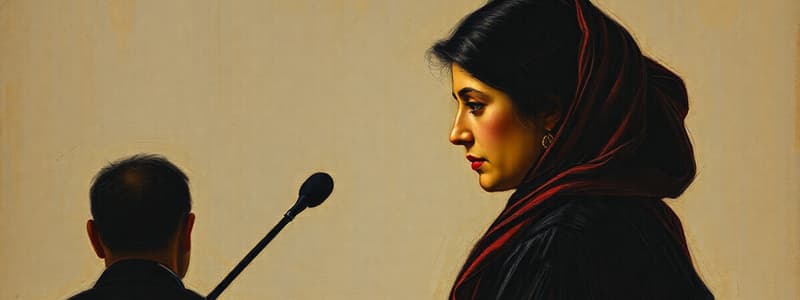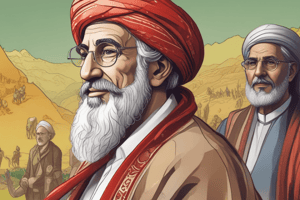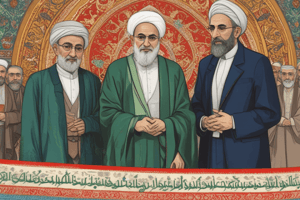Podcast
Questions and Answers
In what ways does Iran's government differ from the U.S. government?
In what ways does Iran's government differ from the U.S. government?
Iran's government is a theocracy, meaning it is ruled by religious leaders, while the United States is a democracy, meaning it is ruled by the people. Iran's government has been known to support a hardline policy in its efforts to control its population, while the U.S. prides itself on its freedom and democratic values.
Why would Iran's government be opposed to Ebadi’s human rights efforts?
Why would Iran's government be opposed to Ebadi’s human rights efforts?
The Iranian government often restricts human rights, particularly for women, children, and refugees. Ebadi's efforts to improve these conditions would directly challenge the government's authority and control.
The United States and some of its allies feared that Iran was building nuclear weapons, which could threaten world security.
The United States and some of its allies feared that Iran was building nuclear weapons, which could threaten world security.
True (A)
What is a revolution?
What is a revolution?
What was the Persian Empire known for?
What was the Persian Empire known for?
What changes were made in Iran after the Islamic Revolution?
What changes were made in Iran after the Islamic Revolution?
What kind of leaders have authority over their people in a theocracy?
What kind of leaders have authority over their people in a theocracy?
In what ways does Iran’s culture differ from cultures in other countries of Southwest Asia and from culture in the United States?
In what ways does Iran’s culture differ from cultures in other countries of Southwest Asia and from culture in the United States?
What are some examples of conflict that have shaped current conditions in Iran?
What are some examples of conflict that have shaped current conditions in Iran?
What is the relationship between religion, government, and daily life in Iran?
What is the relationship between religion, government, and daily life in Iran?
Flashcards
Theocracy
Theocracy
A system of government in which religious leaders hold the power, and religious law is the basis for government.
Revolution
Revolution
The process of overthrowing a government, often with violence.
Persian Empire
Persian Empire
The Persian Empire was known for its vast size, powerful military, and sophisticated culture. Famous rulers like Cyrus the Great and Darius the Great expanded the empire and promoted cultural advancements.
Islamic Revolution
Islamic Revolution
Signup and view all the flashcards
Monarchy
Monarchy
Signup and view all the flashcards
Iran's Government after the Islamic Revolution
Iran's Government after the Islamic Revolution
Signup and view all the flashcards
Islamic Republic
Islamic Republic
Signup and view all the flashcards
Hardline Policies
Hardline Policies
Signup and view all the flashcards
Destruction of Israel
Destruction of Israel
Signup and view all the flashcards
Terrorist Groups
Terrorist Groups
Signup and view all the flashcards
Democratic Reforms
Democratic Reforms
Signup and view all the flashcards
Iranian Economy
Iranian Economy
Signup and view all the flashcards
Women's Rights
Women's Rights
Signup and view all the flashcards
Election of Mahmoud Ahmadinejad
Election of Mahmoud Ahmadinejad
Signup and view all the flashcards
Human Rights Advocate
Human Rights Advocate
Signup and view all the flashcards
Shirin Ebadi's Work
Shirin Ebadi's Work
Signup and view all the flashcards
Nobel Peace Prize
Nobel Peace Prize
Signup and view all the flashcards
Opposition to Shirin Ebadi
Opposition to Shirin Ebadi
Signup and view all the flashcards
Fear of Undermining Political Authority
Fear of Undermining Political Authority
Signup and view all the flashcards
Adherence to Islamic Law
Adherence to Islamic Law
Signup and view all the flashcards
Strict Islamic Law
Strict Islamic Law
Signup and view all the flashcards
Opposition to Democracy
Opposition to Democracy
Signup and view all the flashcards
UN Sanctions
UN Sanctions
Signup and view all the flashcards
Lifting of Sanctions
Lifting of Sanctions
Signup and view all the flashcards
Iran's Nuclear Program
Iran's Nuclear Program
Signup and view all the flashcards
Concerns about Nuclear Weapons
Concerns about Nuclear Weapons
Signup and view all the flashcards
Study Notes
Iran's Government Compared to the U.S.
- Iran's government has supported hardline policies, including the destruction of Israel and support for terrorist groups.
- Iran's government briefly considered democratic reforms in 1997.
- However, Iranians elected Mahmoud Ahmadinejad in 2005, shifting away from democratic reforms.
Shirin Ebadi
- Shirin Ebadi received the Nobel Peace Prize in 2003.
- Ebadi is a lawyer, judge, and author.
- She worked to improve human rights in Iran, despite opposition from government leaders.
- Her efforts focused on improving conditions for women, children, and refugees.
Iran's Opposition to Ebadi's Efforts
- The Iranian government likely opposed Ebadi's human rights efforts due to her activism.
- This opposition may result of conflicts between religious views and human rights.
Recent Iranian President
- The new Iranian president wanted Iranians to follow strict Islamic law.
- A reporter asked about plans for reforms. The president stated they did not have a revolution to create democracy.
- Mahmoud Ahmadinejad was reelected in 2009.
- He was unpopular due to accusations of corruption and mismanagement, losing supporters during his second term.
- Hassan Rouhani's election occurred in 2013.
Iran's Nuclear Program
- International debate surrounded Iran's nuclear program.
- Some allies feared Iran building nuclear weapons, threatening world security.
- Iran claimed it used nuclear technology for energy production.
- The UN imposed sanctions on Iran.
2016 Iran Sanctions Relief
- In 2016, countries lifted sanctions after Iran scaled back nuclear activities.
Iran's Economy and Culture
- Lesson covered Iran's history, people, culture, economy, and government.
- Unique cultures in Central Asia will be studied next.
Studying That Suits You
Use AI to generate personalized quizzes and flashcards to suit your learning preferences.




